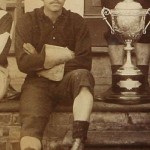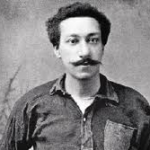Arthur Wharton: The World’s First Black Professional Footballer
Born in the Gold Coast colony, or modern-day Ghana in 1865, Arthur Wharton travelled far to find unlikely sporting success in the north of England. Despite his impressive achievements in a number of athletic disciplines, Wharton life-story was sadly not one of rags to riches, but rather the other way round.
The son of a reasonably affluent Ghanaian parent, Wharton was first sent to England as a ten-year old schoolboy, with his family hopeful that he would eventually become a Methodist preacher or follow in his father’s footsteps as a missionary. Instead he found himself increasingly drawn away from his studies and towards the sports field, where his athleticism was soon earning him a reputation as a budding all- round sportsman who excelled not only in football but also in athletics, cricket, cycling and rugby.
It was his achievements on the running track- and in particular, the setting of the first world sprint record over 100 yards in 1886-that first stood him out, though he was soon showing similar prowess as a footballer.
Starting out with Darlington and Preston North End (with whom he reached the FA Cup semi-finals in 1887), he signed a professional contract for Rotherham Town in 1889, making him the world’s first black professional footballer. A move to Sheffield United five years later, where he was an understudy to the legendary William “Fatty” Foulke, then saw Wharton become the first black footballer to play in England’s top division.
It may seem strange that such fast runner took up goalkeeping duties, but it is believed that Wharton deliberately chose that position to protect his legs from injury at a time when crunching tackles were still encouraged in football.
Drifting from club to club in subsequent years, Wharton also started to lose his way off the pitch, with a worsening drinking habit not helping matters. After managing a number of pubs, he retired from football in 1902 before taking up work as a haulage worker in Yorkshire’s coal mines. In 1930, he died a penniless alcoholic in a Doncaster sanatorium.
It was an ending hardly befitting of a man who had blazed a trail for black sporting professionals long before such a concept had become commonplace.
Established in March 2013, JarusHub is a Nigerian information hub with focus on career and management. It is rated Nigeria's most authoritative destination for online career resources. It parades an array of Nigerian professionals who share their career experiences with a view to bridging career information gap and mentoring a generation to success. Whether you're a student, a recent graduate or an established professional, or even an executive, you will always find something to learn on JarusHub. All enquiries to jarushub@gmail.com or 0808 540 4500. Facebook: www.facebook.com/jarushub; Twitter: @jarushub or @mcjarus.
FEMI TAIWO: WHY MOURINHO FAILED
May 5, 201410 Take-Aways from Nigeria-Italy Match
November 19, 2013
Let us have your say by leaving a comment belowCancel reply
Recommended For You
-
OPEN UNIVERSITY OR A POSTGRADUATE DIPLOMA FOR A POOR-GRADER?
September 11, 2015 -
FOUR VITAL THINGS TO CONSIDER WHEN CHANGING YOUR JOB
April 24, 2018 -
Meet Jarushub Conference Speakers
September 6, 2013








